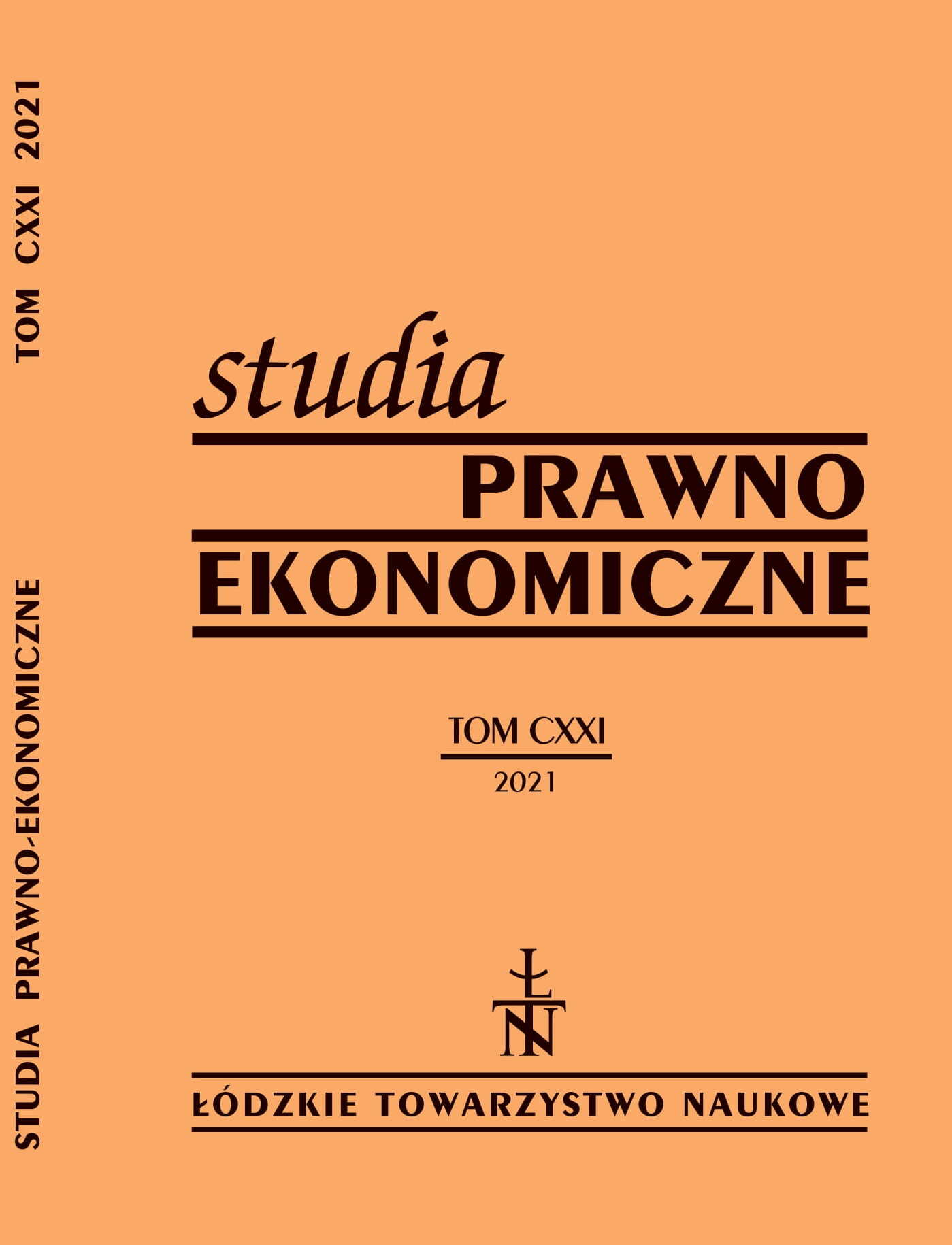Multiregionalism: defeat or victory of the World Trade Organization (WTO)
DOI:
https://doi.org/10.26485/SPE/2021/121/14Keywords:
regional trade agreements, multilateral trade system, trade regionalism, trade multilateralism, WTO, MFNAbstract
Background: For years, a discussion has raged in the economic debate about whether economies should liberalize trade on preferential regional trade agreements or on a most favored nation clause (MFN, trade multilateralism) promoted by the World Trade Organization. Nowadays, all WTO member countries have concluded at least one regional trade agreement. The research focuses on regional preferential trade agreements (RTAs), which can, on the one hand, compete with the WTO but, on the other hand, support the WTO’s multilateral trading system.
Research purpose: This article aims to analyze the changes in the formation of regional trade agreements and their impact on the multilateral trading system. The research will focus on RTA analysis and answer whether RTA plays only a positive (Haberler’s theory) or maybe also a negative (Viner’s theory) role in multilateral trade liberalization.
Methods: The research methods include an analysis of the scientific literature and reports on regional trade agreements, a statistical analysis of the results from secondary sources, and a synthesis, summary, and interpretation of the data. The changes taking place in the RTA were analyzed in terms of quantity (number, dynamics), qualitative (contracts for the liberalization of goods and services), and structural (scope) in recent decades. RTA data were obtained from the WTO and UNCTAD.
Conclusions: Today, each WTO member country is simultaneously bound by a separate trade agreement with one or more other countries. The multilateral MFN is undermined by deeper RTA preferences, making the multilateral trading system less important. RTAs are developing in a way that goes beyond existing multilateral rules.
Downloads
References
Bagwell K., Bown C.P., Staiger R.W., Is the WTO Passé?, Journal of Economic Literature 2016/54 (4), s. 1125–1231.
Baldwin R., Big-think regionalism: a critical survey, NBER Working Paper 2008/14056, https:// www.nber.org/system/files/working_papers/w14056/w14056.pdf; stan na 20.04.2021 r.
Baldwin R., Evenett S., Low P., Beyond Tariffs: Multilateralising Non-Tariff RTA Commitments, w: R Baldwin, P. Low (red.), Multilateralising Regionalism. Challenges for the Global Trading System, Cambridge University Press, Cambridge 2009.
Fabian J., Preferential Trade Agreements vs. Multilateralism: In the New Trump-World, Does Canada Face an Impossible Choice?, A joint Policy Paper from The School of Public Policy and the Canadian Global Affairs Institute, SPP Research Paper 2020/13 (2), s. 1–18.
Fiorentino R.V., Verdeja L., Toqueboeuf Ch., The changing landscape of regional trade agreements: 2006 Update, WTO Discussion Paper 2007/12, s. 1–18.
Goode W., Dictionary of Trade Policy Terms, Cambridge University Press, Cambridge 2003.
Grossman G.M., Helpman E., The politics of free-trade agreements, American Economic Review 1995/85 (4), s. 667–690.
Haberler G., The Theory of International Trade with its applications to commercial policy, Wil¬liam Hodge & Company Limited, London, 1936.
Hoekman B., Kostecki M.M., Ekonomia światowego systemu handlu. WTO: Zasady i mechanizmy negocjacji, Wydawnictwo Uniwersytetu Ekonomicznego we Wrocławiu, Wrocław 2011.
Jones K., Reconstructing the World Trade Organization for the 21st Century. An Institutional Approach, Oxford University Press, Oxford–New York 2015, s. 157–184.
Kemp M.C., Wan Jr. H., An elementary proposition concerning the formation of customs unions, Journal of International Economics 1976/6 (1), s. 95–97.
Key statistics and trends the regional comprehensive economic partnership in trade policy 2020, Report UNCTAD, United Nations, Geneva 2020.
Krishna P., Regionalism and multilateralism: a political economy approach, The Quarterly Journal of Economics 1998/113 (1), s. 227–250.
Lesser C., Do bilateral and regional approaches for reducing technical barriers to trade converge towards the multilateral trading system?, Paris, OECD Trade Policy Working Paper 2007/58, s. 1–74.
Libman A., Eurasian regionalism and the WTO: a building block or a stumbling stone?, Post- Communist Economies 2021/33 (2–3), s. 246–264.
Majchrowska E., Trade regionalism and its relevance to the multilateral system with the WTO in need of reform – the case of EVSWH, Krakowskie Studia Międzynarodowe 2020/1, s. 217–238.
Mansfield E., Reinhardt E., Multilateral determinants of regionalism: the effects of GATT/WTO on the formation of preferential trading arrangements, International Organization 2003/57 (4), s. 829–862.
Mattoo A., Mulabdic A., Ruta M., Trade Creation and Trade Diversion in Deep Agreements, Policy Research Working Paper 2017/8206, s. 1–44.
McLaren J., A theory of insidious regionalism, The Quarterly Journal of Economics 2002/117 (2), s. 571–608.
Michalski B., Porozumienia regionalne w świetle zasad WTO, https://www.ism.uni.wroc.pl/sites/ ism/art/michalski_porozumienia_regionalne_w_swietle_zasad_wto.pdf; stan na 20.01.2020 r.
Mucha-Leszko B., Policentryzacja układu sił gospodarczych a multilateralna polityka handlo¬wa, Annales Universitatis Mariae Curie-Skłodowska. Sectio H, Oeconomia 2012/46 (2), s. 165–174.
Muhannad K., Yucer A., Impact of Regional Trade agreements: Trade creation and Trade diversion in Western Hemispher, International Journal of Economic 2009/3 (2), s. 221–238.
Multilateralism in crisis: Can the world live without WTO?, The Economic Times, November 26, 2020, https://cuts-citee.org/multilateralism-in-crisis-can-the-world-live-without-wto/; stan na 28.07.2021 r.
OECD, https://www.oecd.org/trade/topics/regional-trade-agreements/; stan na 27.07.2021 r.
Orłowska R., Żołądkiewicz K., The new face of the World Trade Organization, Gdansk University Press, Gdansk 2020.
Ornelas E., Rent destruction and the political viability of free trade agreements, The Quarterly Journal of Economics 2005/120 (4), s. 1475–1506.
Regional Trade Agreement Database, http://rtais.wto.org/UI/publicsummarytable.aspx; stan na 20.07.2021 r.
Regionalism: friends or rivals?, https://www.wto.org/english/thewto_e/whatis_e/tif_e/bey1_e. htm; stan na 27.07.2021 r.
Viner J., The Customs Union Issue, Carnegie Endowment for International Peace, New York 1950.
World Trade Report 2011, https://www.wto.org/english/res_e/publications_e/wtr11_e.htm; stan na 20.01.2020 r.
WTO, Regional Trade Agreements Information System (RTA-IS), https://rtais.wto.org/UI/ PublicMaintainRTAHome.aspx; stan na 28.07.2021 r.
Żołądkiewicz K., Orłowska R., Imperfection of the World Trade Organization as a Hazard for International Business, Engineering Economics 2020/31 (3), s. 358–370.



